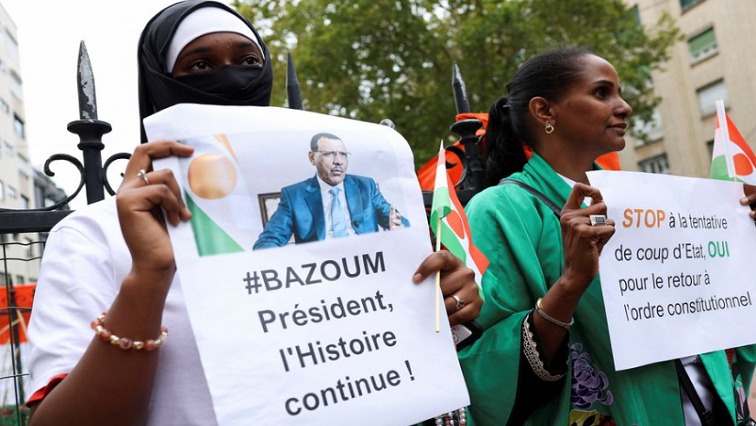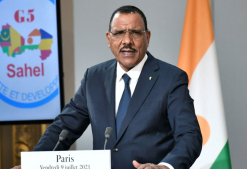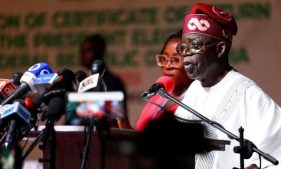Last month’s coup in Niger has raised questions over whether the United States can continue the 1 100-strong military presence in the country that officials and analysts say has been key to fighting militants in the Sahel region.
Over the past decade, US troops have trained Nigerien forces in counterterrorism and operated two military bases, including one that conducts drone missions against Islamic State and an Al Qaeda affiliate in the region.
After ousting President Mohamed Bazoum from office on July 26 and placing him under house arrest, the junta revoked military cooperation agreements with France, which has between 1 000 and 1 500 troops in the country.
So far the United States has not received any request to remove its troops and does not have any indication that it will be forced to do so, said two US officials, speaking on the condition of anonymity.
But with the West African regional bloc ECOWAS threatening military intervention and Russia’s Wagner mercenary group offering help to the coup leaders – both of which could pose safety risks for US military personnel – US planners could find themselves contemplating a future without a foothold in a part of Africa facing insurgencies and where the US vies with Russia and China for influence.
“Our drone base in Niger is extremely important in countering terrorism in the region,” one of the US officials said. “If that closed down, it would be a huge blow.”
FOREIGN ASSISTANCE
The Biden administration has not formally labeled the military takeover in Niger a coup, a designation that would limit what security assistance Washington can provide the country.
Still, the United States last week paused certain foreign assistance programs for Niger and said on Tuesday that included funding for international military education and training and programs that support Niger’s counterterrorism capabilities. Military training is on hold.
US Secretary of State Antony Blinken declined to comment on Tuesday in a BBC interview on the future presence of US troops, who are in Niger with the approval of the ousted government.
The US drone base has grown in importance due to a lack of Western security partners in the region.
Military juntas have come to power through coups in Mali and Burkina Faso – both neighbours of Niger – in recent years. More than 2 000 French troops left Mali last year and a 13 000-strong UN peacekeeping force is due to shut down by the end of the year after the junta abruptly asked it to leave.
The drone base, known as airbase 201, was built near Agadez in central Niger at a cost of more than $100 million. Since 2018, it has been used to target Islamic State and Al Qaeda affiliate Jama’at Nusrat al-Islam wal Muslimeen (JNIM), in the Sahel.
Since the coup, US troops are largely staying on their bases and U.S. military flights, including drones, are being individually approved, according to the US officials.
Cameron Hudson, a former US official who is now at the Centre for Strategic and International Studies (CSIS), said he thinks it is likely Washington will try to keep using the drone base irrespective of who was in charge of Niger.
“From a political or from an optics perspective, it’s certainly easier to defend,” said Hudson, explaining that while the cooperation of Niger’s authorities was needed to stay, it helps the US gather intelligence on militant targets across the region and would not directly benefit the junta.
The US may have to reconsider its presence if the members of ECOWAS, who will meet Thursday, decide to intervene militarily. The junta defied an Aug. 6 ECOWAS deadline to reinstate ousted President Mohamed Bazoum.
Terence McCulley, who previously served as US ambassador to Mali, Nigeria and Ivory Coast and is now at the United States Institute of Peace, said that the US military would make a “force protection decision” if conflict erupted, adding that such an intervention was theoretical at this point and he did not expect ECOWAS would stage such an operation rapidly.
WAGNER COMPLICATION
Another complicating factor could be any decision by Niger’s coup leaders to seek help from Wagner Group, which the US has designated a transnational criminal organization. Wagner’s chief, Yevgeny Prigozhin, has welcomed the coup in Niger and said his forces were available to restore order.
Wagner mercenaries teamed up with Mali’s junta in 2021 and has about 1 000 fighters in the country, where jihadists control large swathes of the desert north and centre.
One of the US officials said if Wagner fighters turn up in Niger it would not automatically mean US forces would have to leave.
The official said a scenario where a few dozen Wagner forces base themselves in Niger’s capital Niamey was unlikely to affect the United States’ military presence.
But if thousands of Wagner fighters spread across the country, including near Agadez, problems could arise because of safety concerns for US personnel.
Regardless, the US will put a high bar for any decision to leave the country.
“The only way this mission ends is if the Nigerien government asks us to leave,” the first US official said. “It’s too important for us to abandon.”






